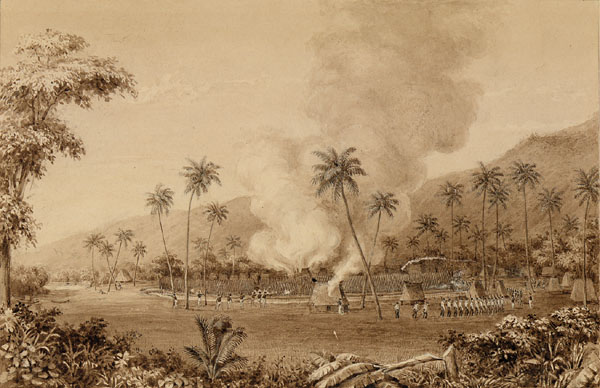|
Emil Von Zelewski
Emil von Zelewski was a German officer of Kashubian descent who served as commander of the Schutztruppe for German East Africa. In the Hehe Revolt he was killed in action during the . Early years Emil von Zelewski was born in Bendargau in the Pomeranian district of Neustadt. He joined the Prussian Army and served in the 99th Infantry Regiment at Posen in 1881. Service in the German East Africa Company In 1886 he retired from the Imperial German Army as a first lieutenant and entered the service of the German East Africa Company (GEAC). In August 1888 he was sent to the city of Pangani, which belonged to the Sultanate of Zanzibar, as a representative of the company. During the meeting, Zelewski's imperious behavior became a trigger for the uprising of the East African coastal population against the GEAC. The company had concluded a coastal and customs treaty with the Sultan in 1887. In return for an annual lease, it took over the administration of the mainland strip of Zanz ... [...More Info...] [...Related Items...] OR: [Wikipedia] [Google] [Baidu] |
Będargowo, Pomeranian Voivodeship
Będargowo ( csb, Bãdargòwò; german: Bendargau) is a village in the administrative district of Gmina Szemud, within Wejherowo County, Pomeranian Voivodeship, in northern Poland. It lies approximately south-west of Szemud, south-west of Wejherowo, and west of the regional capital Gdańsk. For details of the history of the region, see ''History of Pomerania The history of Pomerania starts shortly before 1000 AD with ongoing conquests by newly arrived Polans rulers. Before that, the area was recorded nearly 2000 years ago as Germania, and in modern-day times Pomerania is split between Germany and Pol ...''. The village has a population of 678. References Villages in Wejherowo County {{Wejherowo-geo-stub ... [...More Info...] [...Related Items...] OR: [Wikipedia] [Google] [Baidu] |
Sultanate Of Zanzibar
The Sultanate of Zanzibar ( sw, Usultani wa Zanzibar, ar, سلطنة زنجبار , translit=Sulṭanat Zanjībār), also known as the Zanzibar Sultanate, was a state controlled by the Sultan of Zanzibar, in place between 1856 and 1964. The Sultanate's territories varied over time, and at their greatest extent spanned all of present-day Kenya and the Zanzibar Archipelago off the Swahili Coast. After a decline, the state had sovereignty over only the archipelago and a strip along the Kenyan coast, with the interior of Kenya constituting the British Kenya Colony and the coastal strip administered as a ''de facto'' part of that colony. Under an agreement reached on 8 October 1963, the Sultan of Zanzibar relinquished sovereignty over his remaining territory on the mainland, and on 12 December 1963, Kenya officially obtained independence from the British. On 12 January 1964, Jamshid bin Abdullah, the last sultan, was deposed and lost sovereignty over the last of his dominions, Z ... [...More Info...] [...Related Items...] OR: [Wikipedia] [Google] [Baidu] |
Punitive Expedition
A punitive expedition is a military journey undertaken to punish a political entity or any group of people outside the borders of the punishing state or union. It is usually undertaken in response to perceived disobedient or morally wrong behavior by miscreants, as revenge or corrective action, or to apply strong diplomatic pressure without a formal declaration of war (e.g. surgical strike). In the 19th century, punitive expeditions were used more commonly as pretexts for colonial adventures that resulted in annexations, regime changes or changes in policies of the affected state to favour one or more colonial powers. Stowell (1921) provides the following definition: When the territorial sovereign is too weak or is unwilling to enforce respect for international law, a state which is wronged may find it necessary to invade the territory and to chastise the individuals who violate its rights and threaten its security. Historical examples *In the 5th century BC, the Achaemenid ... [...More Info...] [...Related Items...] OR: [Wikipedia] [Google] [Baidu] |
Mkwawa
Chief Mkwavinyika Munyigumba Mwamuyinga (1855 – 19 July 1898), more commonly known as Chief Mkwawa or Sultan Mkwawa, was a Hehe tribal leader in German East Africa, based in Kalenga, Iringa region, who opposed the German colonization. The name "Mkwawa" is derived from ''Mukwava'', itself a shortened form of ''Mukwavinyika'', meaning "conqueror of many lands". As a young child he was named Ndesalasi, meaning "troublemaker". As an adult he was named Mtwa Mkwava Mkwavinyika Mahinya Yilimwiganga Mkali Kuvagosi Kuvadala Tage Matenengo Manwiwage Seguniwagula Gumganga, meaning: "A leader who takes control of the forests, who is aggressive to men and polite to women, who is unpredictable and unbeatable, and who has the power that it is only death who can take him away." Life Mkwawa was born in Luhota and was the son and successor of Sultan Munyigumba, who died in 1879. In July 1891, the German commissioner, Emil von Zelewski, led a battalion of soldiers (320 askaris with officers a ... [...More Info...] [...Related Items...] OR: [Wikipedia] [Google] [Baidu] |
Hehe People
The Hehe ( Swahili collective: Wahehe) are a Bantu ethnolinguistic group based in Iringa Region in south-central Tanzania, speaking the Bantu Hehe language. In 2006, the Hehe population was estimated at 805,000, up from the just over 250,000 recorded in the 1957 census when they were the eighth largest tribe in Tanganyika. There were an additional 4,023 of them in Uganda in 2014. Historically, they are famous for vanquishing a German expedition at Lugalo on 17 August 1891 and maintaining their resistance for seven years thereafter under the leadership of their chief Mkwawa... Etymology The use of ''Wahehe'' as the group's designator can be traced to their war cry, and was originally employed by their adversaries. The Wahehe themselves adopted it only after the Germans and British applied it consistently, but by then the term had acquired connotations of prestige (keeping in mind, of course, the term's roots in Hehe warfare and the victory over the Germans of 1891). His ... [...More Info...] [...Related Items...] OR: [Wikipedia] [Google] [Baidu] |




